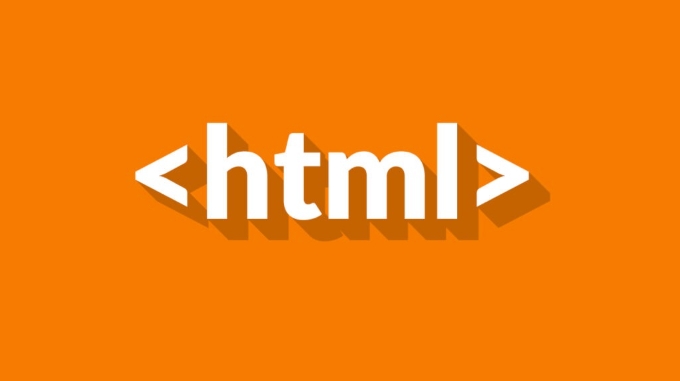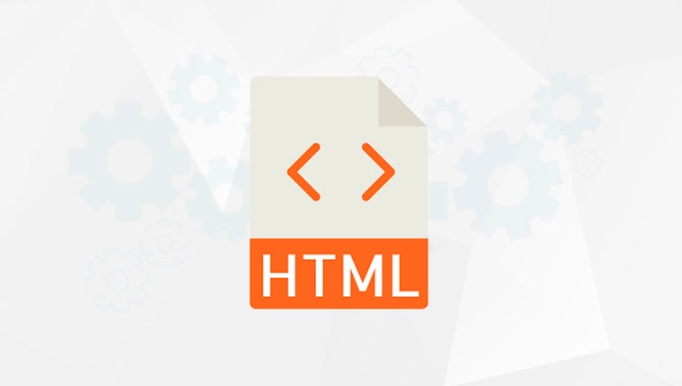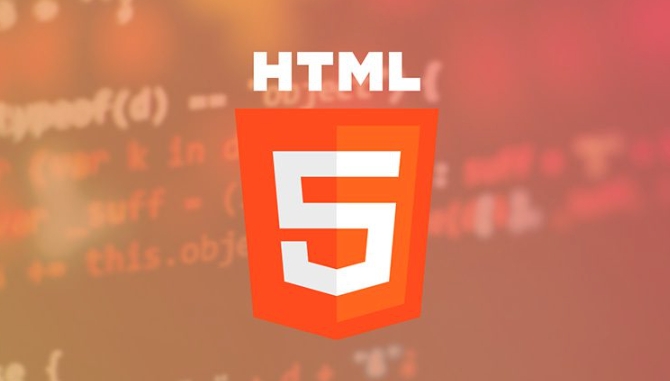Applying the HTML placeholder Attribute to Form Inputs
Jul 04, 2025 am 12:45 AMThe HTML placeholder property is used to display short prompt text in form fields, such as "Enter your email" when entering a mailbox. 1. It is suitable for providing format examples such as date format, username and phone number. 2. Tags should not be replaced to avoid screen readers being unrecognized. 3. Avoid lengthy instructions and keep them concise. 4. Use it with visible tags to ensure that key information is not lost. 5. Pay attention to accessibility and avoid low color contrast or relying on it to convey necessary information. Using placeholder correctly can improve the ease of use of forms.

When you want to give users a quick hint about what they should enter into a form field, the HTML placeholder attribute is a handy tool. It displays a short text inside the input field that disappears when the user starts typing. While it seems simple, there are some important considerations to make sure it's used effectively.

What the placeholder attribute does
The placeholder attribute provides a brief hint or example value for an input field. It's often used in form fields like search bars, email inputs, or name fields. For example:

<input type="text" placeholder="Enter your email">
When this input appears on the page, the text "Enter your email" will show up inside the box, faded or lighter in appearance than normal text. Once the user clicks into the field and starts typing, the placeholder disappears.
This can be useful for giving quick guidance without needing extra labels or toolsets. However, it's not a replacement for proper labeling — more on that later.

When to use placeholder text
Placeholders work best when they offer a simple example or format suggestion. Here are a few good use cases:
- Showing expected date formats:
placeholder="YYYY-MM-DD" - Giving an example of a username format:
placeholder="john_doe123" - Indicating how to structure a phone number:
placeholder="(555) 123-4567"
They're especially helpful when the expected input isn't obvious from the label alone. But again, placeholders shouldn't replace labels entirely. Screen readers may not always read them reliably, which can cause accessibility issues if there's no visible label.
Also, avoid using placeholders as instructions or long explanations. Keep them short and to the point.
Common mistakes with placeholders
A lot of developers fall into a few traps when using placeholders. Here are some common ones:
? Using placeholder text instead of a
<label>
This can confuse users who might forget what the field is for once they start typing.? Putting full sentences or instructions in the placeholder
Something like “Please enter your full name here” is too long and gets cleared as soon as the user types.? Relying on placeholders for critical information
Since placeholder text disappears when the field has content, it's not a good place to put anything essential.
To avoid these pitfalls, always pair placeholders with a visible label, keep the placeholder text short, and don't treat it as the main explanation of what the field is for.
Accessibility tips for placeholder use
Even though placeholders are visual helpers, they need to support accessibility standards too. Here are a few things to consider:
- Make sure each input has a clear associated label using the
<label>tag. - Avoid styling placeholder text too weakly — it should still be readable for users with visual impairments.
- Don't use placeholders alone to convey required formatting; mention it in the label or neary text if needed.
For example:
<label for="phone">Phone Number (format: (555) 123-4567)</label> <input type="text" id="phone" placeholder="(555) 123-4567">
This way, the format is explained even if the placeholder isn't visible anymore.
Using the placeholder attribute well means balancing helpfulness with clarity and accessibility. It's a small feature, but when used right, it makes forms easier to understand at a glance.
Basically that's it.
The above is the detailed content of Applying the HTML placeholder Attribute to Form Inputs. For more information, please follow other related articles on the PHP Chinese website!

Hot AI Tools

Undress AI Tool
Undress images for free

Undresser.AI Undress
AI-powered app for creating realistic nude photos

AI Clothes Remover
Online AI tool for removing clothes from photos.

Clothoff.io
AI clothes remover

Video Face Swap
Swap faces in any video effortlessly with our completely free AI face swap tool!

Hot Article

Hot Tools

Notepad++7.3.1
Easy-to-use and free code editor

SublimeText3 Chinese version
Chinese version, very easy to use

Zend Studio 13.0.1
Powerful PHP integrated development environment

Dreamweaver CS6
Visual web development tools

SublimeText3 Mac version
God-level code editing software (SublimeText3)

Hot Topics
 How do I stay up-to-date with the latest HTML standards and best practices?
Jun 20, 2025 am 08:33 AM
How do I stay up-to-date with the latest HTML standards and best practices?
Jun 20, 2025 am 08:33 AM
The key to keep up with HTML standards and best practices is to do it intentionally rather than follow it blindly. First, follow the summary or update logs of official sources such as WHATWG and W3C, understand new tags (such as) and attributes, and use them as references to solve difficult problems; second, subscribe to trusted web development newsletters and blogs, spend 10-15 minutes a week to browse updates, focus on actual use cases rather than just collecting articles; second, use developer tools and linters such as HTMLHint to optimize the code structure through instant feedback; finally, interact with the developer community, share experiences and learn other people's practical skills, so as to continuously improve HTML skills.
 How do I embed PHP code in an HTML file?
Jun 22, 2025 am 01:00 AM
How do I embed PHP code in an HTML file?
Jun 22, 2025 am 01:00 AM
You can embed PHP code into HTML files, but make sure that the file has an extension of .php so that the server can parse it correctly. Use standard tags to wrap PHP code, insert dynamic content anywhere in HTML. In addition, you can switch PHP and HTML multiple times in the same file to realize dynamic functions such as conditional rendering. Be sure to pay attention to the server configuration and syntax correctness to avoid problems caused by short labels, quotation mark errors or omitted end labels.
 How do I embed video in HTML using the element?
Jun 20, 2025 am 10:09 AM
How do I embed video in HTML using the element?
Jun 20, 2025 am 10:09 AM
To embed videos in HTML, use tags and specify the video source and attributes. 1. Use src attributes or elements to define the video path and format; 2. Add basic attributes such as controls, width, height; 3. To be compatible with different browsers, you can list MP4, WebM, Ogg and other formats; 4. Use controls, autoplay, muted, loop, preload and other attributes to control the playback behavior; 5. Use CSS to realize responsive layout to ensure that it is adapted to different screens. Correct combination of structure and attributes can ensure good display and functional support of the video.
 How do I minimize the size of HTML files?
Jun 24, 2025 am 12:53 AM
How do I minimize the size of HTML files?
Jun 24, 2025 am 12:53 AM
To reduce the size of HTML files, you need to clean up redundant code, compress content, and optimize structure. 1. Delete unused tags, comments and extra blanks to reduce volume; 2. Move inline CSS and JavaScript to external files and merge multiple scripts or style blocks; 3. Simplify label syntax without affecting parsing, such as omitting optional closed tags or using short attributes; 4. After cleaning, enable server-side compression technologies such as Gzip or Brotli to further reduce the transmission volume. These steps can significantly improve page loading performance without sacrificing functionality.
 How has HTML evolved over time, and what are the key milestones in its history?
Jun 24, 2025 am 12:54 AM
How has HTML evolved over time, and what are the key milestones in its history?
Jun 24, 2025 am 12:54 AM
HTMLhasevolvedsignificantlysinceitscreationtomeetthegrowingdemandsofwebdevelopersandusers.Initiallyasimplemarkuplanguageforsharingdocuments,ithasundergonemajorupdates,includingHTML2.0,whichintroducedforms;HTML3.x,whichaddedvisualenhancementsandlayout
 How do I use the element to represent the footer of a document or section?
Jun 25, 2025 am 12:57 AM
How do I use the element to represent the footer of a document or section?
Jun 25, 2025 am 12:57 AM
It is a semantic tag used in HTML5 to define the bottom of the page or content block, usually including copyright information, contact information or navigation links; it can be placed at the bottom of the page or nested in, etc. tags as the end of the block; when using it, you should pay attention to avoid repeated abuse and irrelevant content.
 What is the declaration, and what does it do?
Jun 24, 2025 am 12:57 AM
What is the declaration, and what does it do?
Jun 24, 2025 am 12:57 AM
Adeclarationisaformalstatementthatsomethingistrue,official,orrequired,usedtoclearlydefineorannounceanintent,fact,orrule.Itplaysakeyroleinprogrammingbydefiningvariablesandfunctions,inlegalcontextsbyreportingfactsunderoath,andindailylifebymakingintenti
 How do I use the tabindex attribute to control the tab order of elements?
Jun 24, 2025 am 12:56 AM
How do I use the tabindex attribute to control the tab order of elements?
Jun 24, 2025 am 12:56 AM
ThetabindexattributecontrolshowelementsreceivefocusviatheTabkey,withthreemainvalues:tabindex="0"addsanelementtothenaturaltaborder,tabindex="-1"allowsprogrammaticfocusonly,andtabindex="n"(positivenumber)setsacustomtabbing






